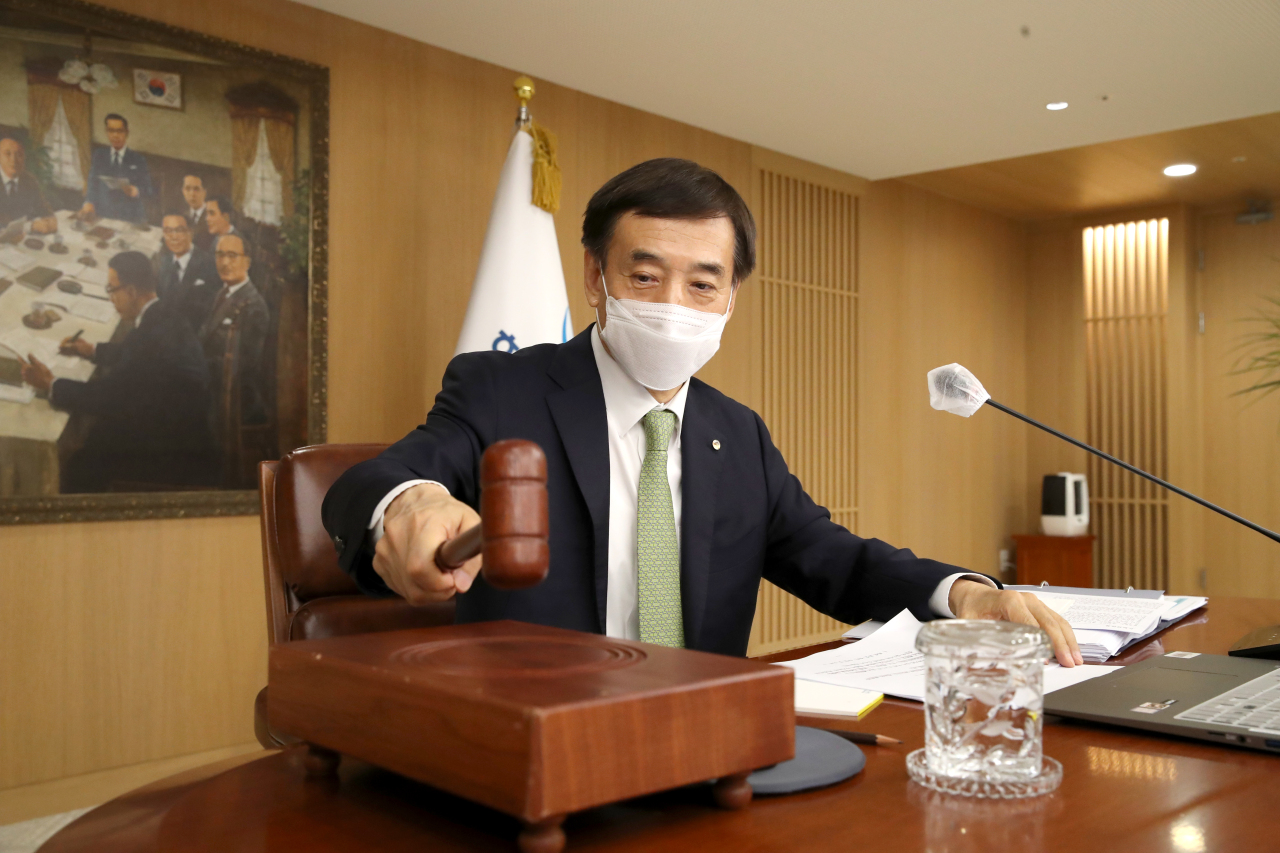BOK chief vows to adjust monetary easing in line with economy
By Jung Min-kyungPublished : Dec. 31, 2021 - 14:52

The chief of the nation’s central bank said Friday that monetary easing will be broadened in tandem with the pace of the economic recovery next year.
“Additional moves related to monetary easing will be carried out after closely reviewing the development of economic growth and inflation,” Bank of Korea Gov. Lee Ju-yeol said in his New Year’s address.
“Imbalances in the financial market and shifts in monetary policies of key economies will be taken into consideration as well,” he added.
Lee explained the BOK carried out two pandemic-era rate hikes as Korea’s economy saw faster-than-expected rebound from COVID-19 woes, driven by robust exports and infrastructure investment.
The BOK in August and November hiked its benchmark interest rate by a quarter percentage point each, raising the rate to the current 1 percent. The move put an end to more than a year of record-low interest rate of 0.5 percent, which it had maintained to cushion the economy from the pandemic.
Onlookers project the BOK to carry out an average two rate hikes next year. The rate is expected to be raised to 2 percent through two rate hikes in 2022, Kim Heung-chong, head of the Korea Institute for International Economic Policy, recently said in an interview with Yonhap News Agency.
The BOK chief picked prolonged inflation as another keyword that could hinder Korea’s growth next year.
South Korea’s consumer prices grew at the sharpest pace in a decade in 2021 from surging oil and energy prices, services and agricultural goods, data from Statistics Korea showed Friday. It grew 2.5 percent on-year in the cited period.
On the nation’s snowballing household debt, he voiced concerns of financial imbalances stemming out of the momentum. “We must actively resolve the weak points of our economy such as the excessive debt burden,” he said.
Household credit came to a record high of 1,844.9 trillion won ($1.5 trillion) as of the end of September, gaining 36.7 trillion won on-quarter.
On development of the central bank digital currency, more widely known as CBDC, Lee pledged to bolster its research on its technology and system. The BOK has been carrying out CBDC research and pilot tests in a virtual environment since February 2020.
Lee also vowed that the BOK will contribute to the nation’s roadmap to carbon neutrality, saying the central bank will roll out green, yet realistic monetary measures.
Lee’s current and second term as BOK governor is set to end March 2022. He rose to the position in April 2014, and is the first BOK chief to serve two consecutive terms in in more than 40 years.
“Additional moves related to monetary easing will be carried out after closely reviewing the development of economic growth and inflation,” Bank of Korea Gov. Lee Ju-yeol said in his New Year’s address.
“Imbalances in the financial market and shifts in monetary policies of key economies will be taken into consideration as well,” he added.
Lee explained the BOK carried out two pandemic-era rate hikes as Korea’s economy saw faster-than-expected rebound from COVID-19 woes, driven by robust exports and infrastructure investment.
The BOK in August and November hiked its benchmark interest rate by a quarter percentage point each, raising the rate to the current 1 percent. The move put an end to more than a year of record-low interest rate of 0.5 percent, which it had maintained to cushion the economy from the pandemic.
Onlookers project the BOK to carry out an average two rate hikes next year. The rate is expected to be raised to 2 percent through two rate hikes in 2022, Kim Heung-chong, head of the Korea Institute for International Economic Policy, recently said in an interview with Yonhap News Agency.
The BOK chief picked prolonged inflation as another keyword that could hinder Korea’s growth next year.
South Korea’s consumer prices grew at the sharpest pace in a decade in 2021 from surging oil and energy prices, services and agricultural goods, data from Statistics Korea showed Friday. It grew 2.5 percent on-year in the cited period.
On the nation’s snowballing household debt, he voiced concerns of financial imbalances stemming out of the momentum. “We must actively resolve the weak points of our economy such as the excessive debt burden,” he said.
Household credit came to a record high of 1,844.9 trillion won ($1.5 trillion) as of the end of September, gaining 36.7 trillion won on-quarter.
On development of the central bank digital currency, more widely known as CBDC, Lee pledged to bolster its research on its technology and system. The BOK has been carrying out CBDC research and pilot tests in a virtual environment since February 2020.
Lee also vowed that the BOK will contribute to the nation’s roadmap to carbon neutrality, saying the central bank will roll out green, yet realistic monetary measures.
Lee’s current and second term as BOK governor is set to end March 2022. He rose to the position in April 2014, and is the first BOK chief to serve two consecutive terms in in more than 40 years.







![[Graphic News] More Koreans say they plan long-distance trips this year](http://res.heraldm.com/phpwas/restmb_idxmake.php?idx=644&simg=/content/image/2024/04/17/20240417050828_0.gif&u=)
![[KH Explains] Hyundai's full hybrid edge to pay off amid slow transition to pure EVs](http://res.heraldm.com/phpwas/restmb_idxmake.php?idx=644&simg=/content/image/2024/04/18/20240418050645_0.jpg&u=20240419100350)






![[From the Scene] Monks, Buddhists hail return of remains of Buddhas](http://res.heraldm.com/phpwas/restmb_idxmake.php?idx=652&simg=/content/image/2024/04/19/20240419050617_0.jpg&u=20240419175937)

![[KH Explains] Hyundai's full hybrid edge to pay off amid slow transition to pure EVs](http://res.heraldm.com/phpwas/restmb_idxmake.php?idx=652&simg=/content/image/2024/04/18/20240418050645_0.jpg&u=20240419100350)

![[Today’s K-pop] Illit drops debut single remix](http://res.heraldm.com/phpwas/restmb_idxmake.php?idx=642&simg=/content/image/2024/04/19/20240419050612_0.jpg&u=)